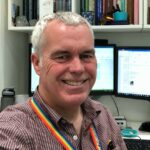
Explore a creative response to scientific research in this Translating Science commission.
Translating Science is a collaborative project which brings seven scientists from the Norwich Research Park together with established writers so that experts within two very different fields of work can gain fresh insight and inspiration from each other.
The scientist welcomed the writer into their world and explained their research, and the writer then went away and responded creatively to what they were shown. The result is a series of stories, poems and essays which will hopefully inspire, excite and trigger a deeper understanding of the benefits of science-based research for solving the many challenges we face, and help to influence policy and decision makers to make the right choices. Read through the rest of our commissions →
Orange
Novelist Megan Bradbury has written a piece inspired by studies on food structure, colloids, and digestion, by Professor Pete Wilde at The Quadram Institute. Megan said:
‘Pete Wilde researches how the structure of food influences digestion, the release of nutrients and sub-sequent health impacts. Using structure and complexity as a starting point, ‘Orange’ considers patterns and outcomes of complexity and diversity within the body, the mind, and in populations.
‘The body benefits from the complexity of well-structured foods, just as a society benefits from the diversity of its citizens. Blandness and efficiency in both cases can be detrimental to health.
‘‘Orange’ is an attempt to untangle (or tangle) this.’
Orange
(i)
It would be easier to drink the juice, just drink the juice. The orange is round. It has a skin. You must peel it. This takes time. Plunge your thumbnail in. The juice will spurt, sting your eye. You need a strong thumbnail and thumb. This isn’t going to be a walk in the park. A park is a good place to eat an orange. But what do you do when you have eaten it and your hands are covered in juice? Not just the juice but also the pith, white and sticky? It would be easier to drink the juice. Juice cartons are available from most newsagents. Packaged at your convenience in small boxes. Straws are stuck to the side. You needn’t ever touch the orange. You don’t have to get it on your hands. You needn’t make a mess. When you are finished, you can dispose of the carton in a bin placed specifically in the park for this purpose. You needn’t take it with you. You can just continue on your way as if you had never drunk the juice. But the thumb, sore from peeling the orange, will remember peeling that orange, and it will be tired from that, and the effort it took to peel that orange will be absorbed somewhere in the body or will be used to prevent illness in the body, or will simply become part of a memory of this day, how you should have packed a more mobile and less messy fruit, and this memory will become part of the body, just as the structure of the orange in being digested by the body becomes part of the body. The stomach moves with the orange in a way it does not with the juice. This activity is good. This is what the body wants. The body wants the orange, not the juice. The body does not want an easy walk through the park. Let things be hard. You can just pick the orange from a tree and eat it. An orange is an orange.
(ii)
We were told by the institution to keep a diary of reflection.
I wrote,
Soils are the earth’s dynamic skin. Vulnerable. They respond to what we do to them.
One scientist in the seminar was nicknamed Doctor Doom because his predictions about the effects of climate change were dismal. Once the moths have gone, that’s it, he said. But people won’t listen to the story. People won’t even listen to the facts.
I began collecting the facts. I asked the scientists what they knew. They spoke about understandings and connections. I realised art and science were the same.
I learnt,
Nutrients are essential.
Foods should be consumed slowly.
95% of what we eat relies on soils. That is, the foundations we lay down.
Food with a complex structure has more to give.
Simplicity is killing us.
We watched a film showing a conveyer belt moving plants slowly through a lab, stopping to commit the plants to different atmospheric conditions. This study showed the scientists how changes in climate influenced the growth of crops. Knowing this meant we would one day be able to predict the best conditions in which to grow our food.
I asked Doctor Doom,
Will this be enough?
I looked at my own face in the small box in the corner of the screen.
The plants are just like us. They need love and the right conditions to thrive.
I learnt,
Research is being conducted into making the foods we eat more nutritious. But it is important the public don’t learn that this is being done. If they learn that what they are eating is healthier than usual, they will adapt their habits in response, eat more, for instance.
The process of our study was frustrating. The digital conference technology we were using to communicate kept freezing then raced ahead to catch up with itself. When the connection froze, we did not know who was saying what. Sentences became stuck in the middle. Meaning fragmented then fell away entirely. I heard the echo of a laugh then a tinny stilted voice acknowledging that this process closely resembled the main constraint of both science and poetry: the ability to communicate effectively.
The writing needs to be as active as the science, the organiser said.
Story isn’t necessary, a poet said.
(iii)
Now, I find myself looking back. Our diet has become very bland. There are not enough people to pick the fruit. Boats used to bring people as well as goods. Now, no boats come. I can’t remember a time when I ate something I wanted. Olive groves on the continent are at risk of drought due to climate change. Simplicity is fashionable, complexity out of date. I miss foil wrappers, their bright colours. Fresh produce grows abundantly in Europe, but we have no ships. I have always been told throughout my life that what I needed was greater structure and complexity. People round here keep yelling that they want their country back. I hear the scientists have moved to Europe. When the digestive system breaks down food, it releases nutrients that give us energy. Processes work in conjunction with one another. Starch reacts to fibre, for instance. I wonder if we could have found a way to work together rather than beat each other down. The body doesn’t work this way. These days, it rains and rains. These days, grain is milled to dust. Butter is spread thinly to make it last. Butter is processed simply, but it is unhealthy. The complexity of olive oil spread was what made it good.
Lost, I try to remember. I remember the scientists said,
The intricacies of elements and contributions
Happy accidents, failed experiments, yielding positive outcomes and useful data
The mask of definiteness
The process of applying for funding can restrict ideas, but it can also liberate them
Frustration – funding creative proposals
Risk averse funding bodies
Perspective – to look up at the rest of the world
There is positivity to be found in failure
(iv)
These days, we must make bread ourselves.
The kneading hurts my hands.
The needing hurts my heart.
I must find a warm place where the dough can rise.
These days, my house is cold; gas is expensive. The flour I use is very simple. Whole grains are no longer consumed. This country itself isn’t whole; it has split into parts.
Tinned corn contains more nutrients than fresh.
I keep myself warm with the aid of a blanket.
We were told to write our emotions down.
I wrote,
Anxiety
The hardest part should be the science, but the hardest part is the communication of the science. We’ve solved the science, the scientists said. All we need now is for the public to believe us. Science isn’t the problem; belief is the problem.
People say,
The earth is flat.
No, the earth is round, like an orange.
No, the earth is an irregularly shaped ellipsoid.
We were told,
Diversity will always benefit a system.
But they turned back the people in the boats. Many drowned.
Now, we are waiting. I don’t know what for.
We were told,
Our bodies and diet have split apart – the food we eat is situated in the present while our biology is stuck in the past.
But we have not returned to Palaeolithic times, for the soil, these days, is barren.
 Megan Bradbury is a novelist based in Norwich. Her first novel, Everyone is Watching, was published by Picador in 2016. The book explored the relationship between art, sex and urban planning in New York City throughout the twentieth century through the consciousnesses of leading cultural figures from the city’s history (among them, Walt Whitman, Robert Moses, Robert Mapplethorpe and Edmund White). Described as a ‘beating heart of a novel’ by Ali Smith, and ‘one of the best de-buts I’ve read in years’ by Eimear McBride, the book was longlisted for the Rathbones Folio Prize and Not the Booker Prize, and was chosen as one of the Guardian’s Best Books of 2016.
Megan Bradbury is a novelist based in Norwich. Her first novel, Everyone is Watching, was published by Picador in 2016. The book explored the relationship between art, sex and urban planning in New York City throughout the twentieth century through the consciousnesses of leading cultural figures from the city’s history (among them, Walt Whitman, Robert Moses, Robert Mapplethorpe and Edmund White). Described as a ‘beating heart of a novel’ by Ali Smith, and ‘one of the best de-buts I’ve read in years’ by Eimear McBride, the book was longlisted for the Rathbones Folio Prize and Not the Booker Prize, and was chosen as one of the Guardian’s Best Books of 2016.
She is an experienced artistic collaborator and has worked on commissioned projects with acclaimed artists from across the world. She holds an MA in Creative Writing from the University of East Anglia, and she has been the recipient of a Charles Pick Fellowship, an Escalator Award, two writing awards from Arts Council England and one from the Authors’ Foundation.

Professor Pete Wilde originates from Yorkshire, graduated in Biophysics at UEA and has lived in Norwich ever since. He began work at the former Institute of Food Research, now the Quadram Institute, investigating the molecular and structural basis of the physical stability of foods such as foams, emulsions and gels. He has since applied these approaches to understanding the nutritional basis of the food we eat. His main area of research is determining how the structure of food influences digestion, release of nutrients and subsequent health impacts.
You may also like...
Microfictions
A Translating Science commission from writer and singer-songwriter Jess Morgan, inspired by research from Dr. Bethany Nichols

3rd April 2023




